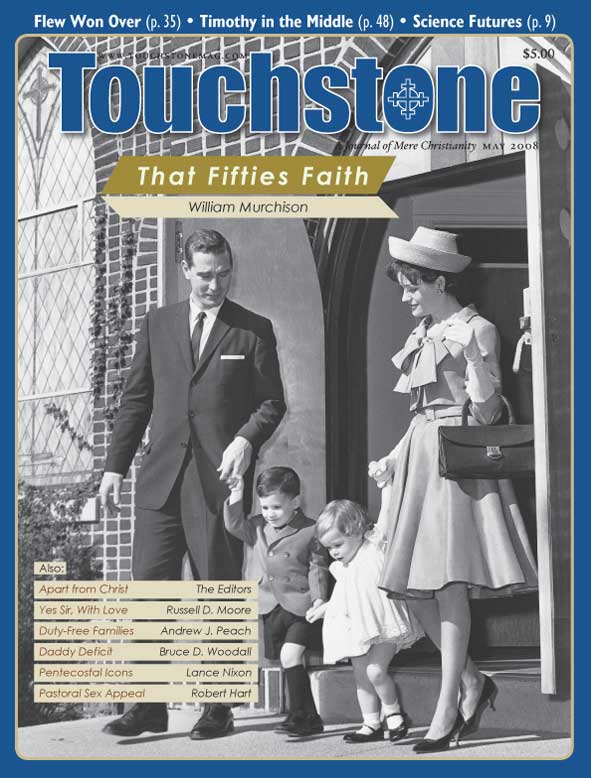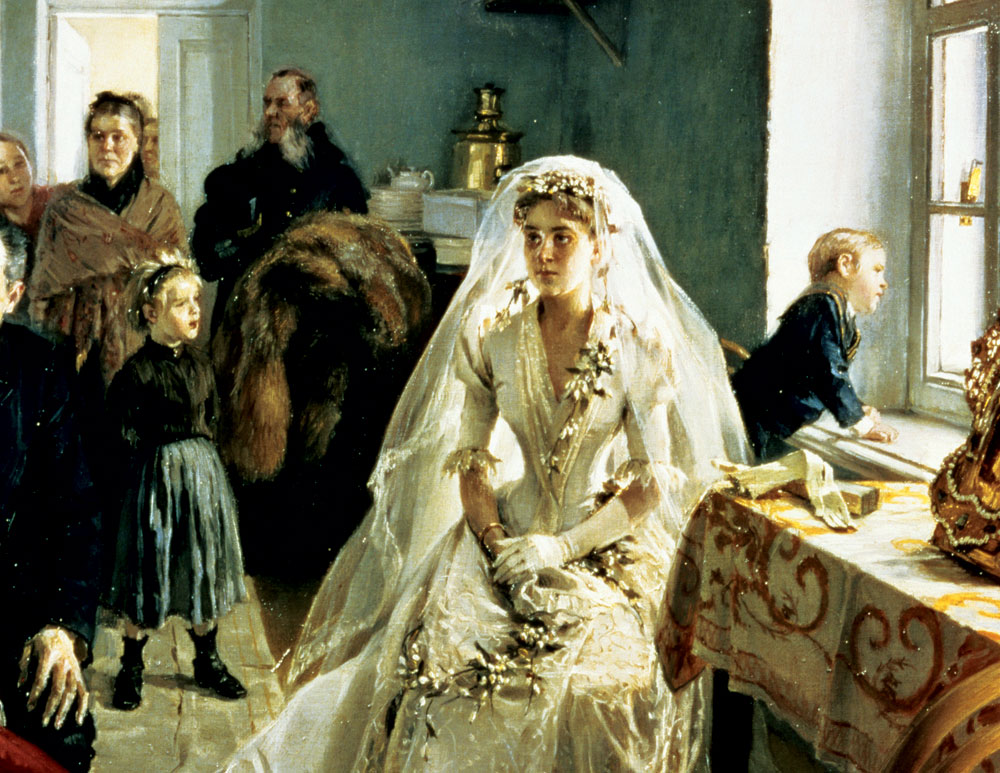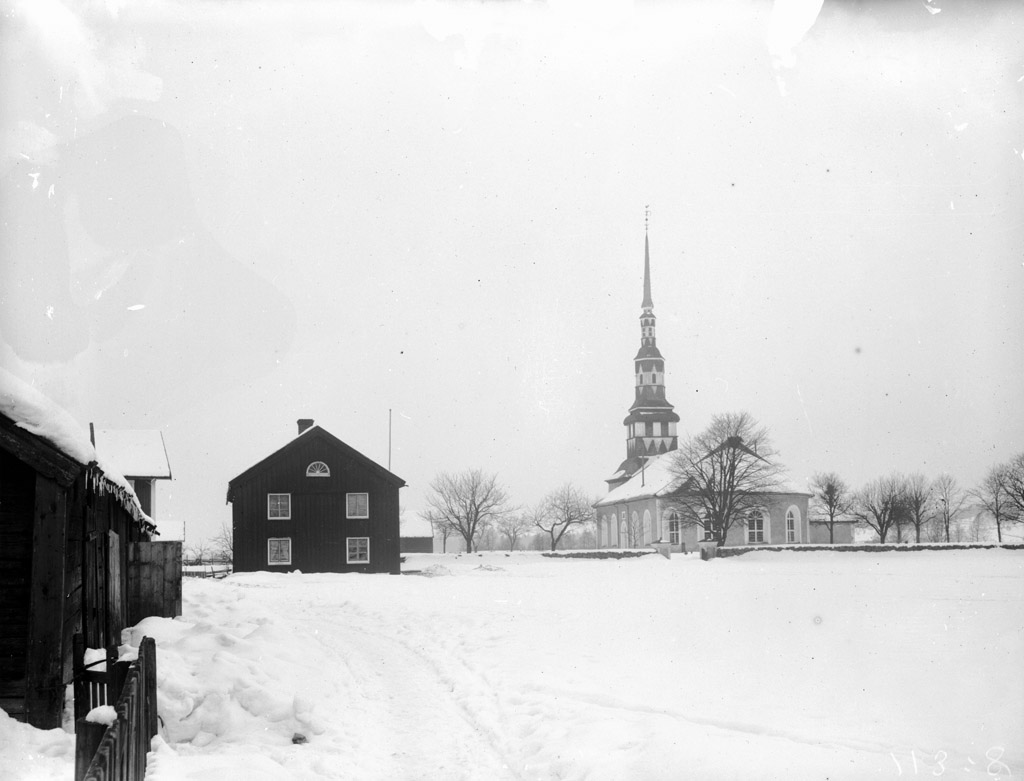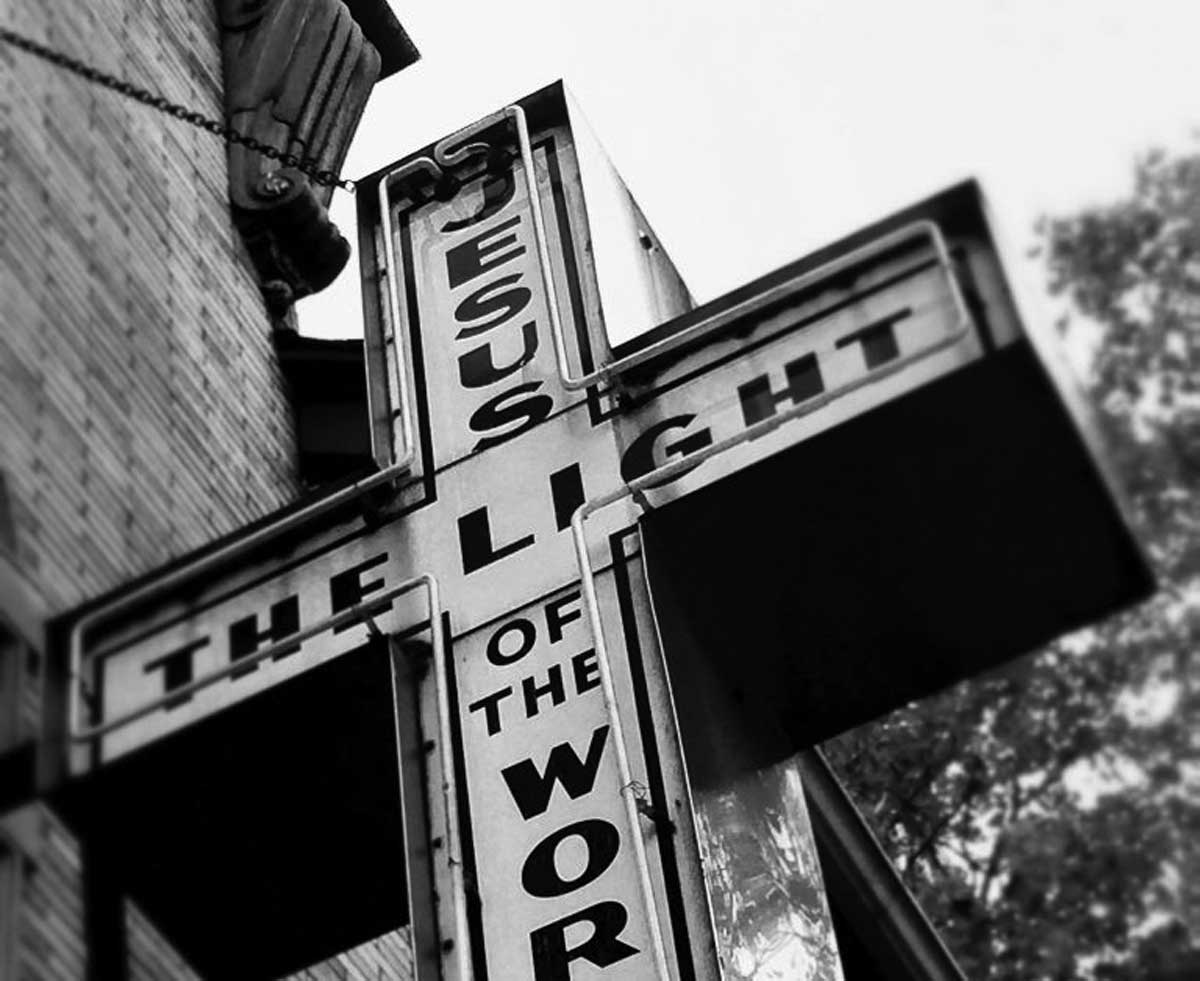Feature
The Duty Free Family
Choice Is a Universal Acid That Dissolves All Ties That Bind
by Andrew J. Peach
Good parents don’t think to ask the philosophical questions of what makes one a parent and why parents are obligated to care for their children. The intensity of their love and devotion carry them through feeding and clothing their children, driving them to school and soccer and the doctor, washing their clothes, listening to their sorrows, correcting them.
But the moral truth is that they do have to take care of their children, and the philosophical question why they have to is of paramount importance in a culture governed by the logic of voluntarism—generally expressed as a belief in “choice”—for voluntarist logic eliminates parental obligations.
Voluntarism is the idea that all one’s significant obligations are voluntarily incurred; that the circumstances or biological relationships in which people find themselves have no moral bearing. The natural bond between mother and child bears no moral weight, for example. (And what makes a biological father a parent is never clear).
What makes a woman a parent is not that she is a biological mother but that she has chosen to accept a child nature has offered her for her consideration. In a voluntarist culture, all children, even those cared for by their biological parents, are adopted children.
Planned Parenthood, for example, the premiere abortion provider in America, whose very name rejects the idea of natural obligations, declares in its mission statement:
Reproductive freedom—the fundamental right of every individual to decide freely and responsibly when and whether to have a child—is a reaffirmation of the principle of individual liberty cherished by most people worldwide. It helps to ensure that children will be wanted and loved, that families will be strong and secure, and that choice rather than chance will guide the future of humanity.
Assuming Responsibility
In a much more direct fashion and with much less politically charged language, Judith Jarvis Thomson, professor emerita at M.I.T. and the most renowned defender of abortion rights in the history of Western philosophy, arrives at the same conclusion in her landmark article “A Defense of Abortion.” “Surely we do not have any such ‘special responsibility’ for a person unless we have assumed it, explicitly or implicitly,” she argues.
If parents did not try to avoid pregnancy and did not abort the child but brought him (she uses “it”) home instead,
then they have assumed responsibility for it, they have given it rights, and they cannot now withdraw support from it at the cost of its life because they now find it difficult to go on providing for it. But if they have taken all reasonable precautions against having a child, they do not simply by virtue of their biological relationship to the child who comes into existence have a special responsibility for it. They may wish to assume responsibility for it, or they may not wish to.
Likewise, David Boonin of the University of Colorado, whose A Defense of Abortion attempts to bolster Thomson’s voluntarist thesis, expresses perplexity at the notion that biological relationships could somehow have ethical relevance. “[I]t seems to be utterly mysterious,” he declares, “how the mere fact of biological relatedness could, in and of itself, generate such a difference in moral obligations.”
As people like this understand the matter, the relationship between mother and child is akin to that of any person to a stranger in need of help. No one is morally compelled to help such a stranger, especially as such help can be exceedingly burdensome. As Boonin puts it,
A woman who carries a pregnancy to term is like a person who generously offers at some considerable cost to herself to provide what another needs but does not have the right to, while a woman who declines to carry a pregnancy to term is like a person who declines to offer such assistance.
Obliging Relationships
What is obvious to critics of voluntarism, especially those whose views are informed by Christian faith, is that we have stations in life, very often not of our own choosing, and that those stations come with duties, very often not of our own choosing. And sometimes those duties call for radical sacrifice, even the giving of one’s own life.
Relationships give rise to obligations, and virtue demands that we hold our post. Nature is not an amoral or neutral playing field in which disembodied Kantian wills enter into social contracts; it is the already given environment, with its own moral contours, in which any choice is to be made. What makes a mother and father parents is that they are, in fact, and regardless of whether or not they wish to be, biological parents.
How, though, is one to confront someone who does not see nature in this fashion? Perhaps Flannery O’Connor’s approach is best: “[T]o the hard of hearing you shout, and for the almost-blind you draw large and startling figures.”
In the more precise language of philosophy: To those who deny the obvious, keep pushing their logic until it leads them to conclusions so outlandish that they have to abandon their original position. As the twentieth-century French philosopher Yves Simon phrases the matter:
Now when somebody denies an obvious fact or a self-evident principle he cannot be refuted by demonstration, for it is not possible to demonstrate the obvious. What is possible is to draw [out] the consequences of his denial and to corner him either into confession of the obvious or into silence.
In the paragraphs to follow, I will shout and draw large and startling figures. I will draw conclusions from the voluntarist denial of natural parental obligations that will corner the apologist for “choice” into confession of the obvious: the existence of natural parental obligations.
Unchosen Family
One of the more obvious problems with the voluntarist paradigm is that when the denial of natural parental obligations is extended to biological fathers, the grounds for paternity become exceedingly tenuous. Boonin actually embraces the voluntaristic basis for fatherhood:
If the man took reasonable precautions and made clear to the woman that he was unwilling to become a father, then while we may still be justified in saying that he is now behaving selfishly or callously, it may seem less clear that we would be justified in saying that he is violating the moral rights of the child or of the woman.
In other words, the forthright dead-beat dad does nothing unjust.
If all children are adopted, why shouldn’t the biological father be given a choice as to whether or not he wishes to be an adoptive parent? If biological maternity does not make a woman a parent, why should biological paternity compel a man to be a parent? Why, to make the matter practical, should any man be forced to pay child support for a child he fathered, if he does not choose to accept fatherhood? Why are those who fail to do so called “dead-beat dads” when clearly they have rejected fatherhood?
Can anyone seriously think that a child whose father abandoned him at birth would eventually conclude that no wrong had been done to him? That a child might reasonably think, “My father wanted nothing to do with me, but he was upfront with my mother about it before they had sex, so what do I have to complain about?”
Against this view of fatherhood stands the judgment of nearly the entire human race that biological fathers, whatever they did or did not say before intercourse, are morally obligated to provide financial, emotional, moral, and spiritual support to their offspring, or they are monsters. Even in the United States, which has the most liberal abortion laws in the world, dead-beat dad laws exist as a minimal (and entirely inadequate) response to this particular brand of villainy.
Nor can voluntarists make sense of familial relations more generally. Just as biological fathers and mothers have obligations to their children because they are their biological parents, biological brothers and sisters have obligations to one another because they are biological brothers and sisters.
If a sister who has been diagnosed with cancer needs a bone marrow transplant, a brother of hers healthy and old enough to donate marrow would seem to have at least a prima facie duty to his sister to help her. Less problematically, if the parents of young children die in a car crash, their older siblings would be morally obligated to raise the children, if no other arrangement had been made.
Custody Questioned
Perhaps the most disquieting consequence of the denial of the moral relevance of biology to parental obligations is that it leaves the question of the custody of the child in question.
The voluntarist equates pregnancy with helping a stranger to whom one owes nothing and abortion with declining to give such help. So why does the newly conceived child belong to the biological father and mother in the first place? If all children are, in all essentials, adopted from nature, why do the biological parents get first dibs on adopting the child, aborting the child, or giving the child up to another adoptive couple?
In the world of common sense and natural obligations, a biological child belongs to a biological parent because of biology. A child belongs to his biological parents because he is the product of their germinal material and their act of sexual intercourse. All of the ordinary or commonsense reasons for explaining why a child is mine are biological.
The voluntarist might retort, following Thomson, that the child belongs to the mother because she chose to bring him to term and take him home. But this answer is certainly not in keeping with the voluntarist logic of pregnancy: Why does the fact that a person volunteered to house and care for a stranger for nine months give her custody of that person? How can that give the child any claim upon her care?
If the biological bond between mother and child is morally insignificant, then biological mothers are more properly viewed as surrogates. Surrogates, in the world of choice, have no natural claims upon the children they carry. And even if carrying the child to term mystically renders the biological mother a parent, the father’s custody of the child remains a mystery. He went through neither pregnancy nor labor, he did not house the stranger, so why is the child his?
The upshot of these considerations is that the voluntarist faces an obvious and unavoidable dilemma: He must somehow invest the biological bonds in question with just enough moral significance to give custody of the child to his biological mother and father but not enough moral significance to obligate these two to take care of him if they do not wish to.
He needs a case for natural custody which is also a case against natural obligations, and yet it is difficult to see why a case for the former would not simultaneously be a case for the latter. If the biological mother claims that the child she chooses is hers because the child contains her genetic material, then why isn’t the mother obligated to any child she conceives because he contains her genetic material? If the biological mother claims that the child is hers because she engaged in the sexual act that produced him, then why isn’t she obligated to the child because she engaged in the act that produced him? And so on.
There is no way out of this dilemma. The narrow confines of a voluntarist philosophy give no room for a coherent philosophy of family life. Its only consistent response to such questions is to admit that no one, not even the mother, is the natural custodian of her child.
Ordinary Obligations
The last of the large and startling consequences to be drawn from the voluntarist logic concerns the nature of obligations and the way this nature is related to “choice.” Does this logic do justice to our ordinary understanding of our obligations?
The most obvious answer is no, because a great many—perhaps a majority—of the obligations under which a person finds himself are not of his choosing. Unlike the radically autonomous individuals of the world of choice, actual people find themselves enmeshed in a web of relationships that carry obligations with them, even if they did not choose most of those obligations.
Siblings have natural obligations to each other and even to each other’s children simply by virtue of being siblings. Children, who did not choose to be conceived or delivered, find themselves obligated to their parents, especially in the latter’s twilight years.
We find a neighbor’s small child wandering into the road and are now compelled to save him; we come upon a car crash on an abandoned country road and are now duty-bound to offer what assistance we can; we hear of the needs of the poor and are now obligated, in some general way, to help what poor we can; we find ourselves indebted to an entire society that nurtured and raised us and now demands our time, talent, and material resources for its continuation and betterment.
A far deeper criticism goes to the very heart of the notion of obligation. As voluntarists note, we choose some obligations. I am only obligated to my wife because I chose to marry her; I am only obligated to the bank because I chose to take out a loan; and I am only
obligated to my employer because I chose to work there.
However, even in these instances, it is never choice per se that obligates anyone. Only an overt or publicly executed act does so.
A man, after deliberating for some time, might choose to take out a car loan, but at that moment of choice, seated in his living room, he has not secured the loan and has done nothing to obligate himself to anyone. Until he actually signs a contract, he can change his mind at any moment, without any obligation. Only when he has signed the contract is he duty-bound to repay the loan and the interest.
Now, if it is indeed the case that chosen obligations must follow upon overt or publicly executed acts, it is worth asking what exactly a woman does, in the voluntarist world, to obligate her to her child.
It cannot be her choice to copulate, for then she would have been obligated to her child from the moment of conception. It cannot be the act of going through with the pregnancy and giving birth to the child, for, to the voluntarist, the mere fact that she offered assistance to a stranger for nine months cannot now obligate her to care for him for the next eighteen years (or, more accurately, for the rest of her life).
Voluntarist Obligations?
The voluntarist maintains that a woman is free to cut off assistance to a stranger at any time, which is why an abortion can be secured at any time during the pregnancy. But if she is free to cut off assistance any time during the first nine months of the child’s life, why isn’t she free to cut off assistance any time during the next eighteen or more post-natal years?
One possible voluntarist answer is Thomson’s: that the decision to have the baby and take him home marks the magic moment when parental obligations begin. But it is hard to see why this cutoff point is anything more than arbitrary. Why isn’t the point of no return when the pregnant mother can feel the child kicking? Or the point where she can judge the new child’s effect on her life, her other children, her finances? Or when, years later, she discovers the effects of adolescence?
Another possible answer is that the mother obligates herself by making a promise to the child to nurture, care for, and protect him into adulthood. But it is far from clear that one can promise anything to someone who does not know that any promise has been made (or even what a promise is). Can I make a promise to the President of the United States, whom I have never met, that I will quit smoking? Do I betray him if I fail to carry out this promise?
And what is the time limit for this promise to be made: Before intercourse? When the pregnancy is discovered? When the child can be felt? Immediately after birth? Or is there a grace period after delivery when the mother can deliberate over the choice to promise?
Finally, as a last-ditch effort, the voluntarist might argue that the state initially owns the child, and when the mother leaves the hospital with him, she is now obligated to him through her obligation to the state. But how did the state acquire custody of the child to begin with—what did it do to become the natural custodian of the child? And if the state is obligated to the child, how can it transfer its obligations to another?
If these three voluntarist answers cannot establish why the mother is obligated to the child, they fail equally to establish the father’s obligation. Boonin’s voluntarist logic is chillingly consistent: It is “utterly mysterious” what a biological father could do to obligate himself to his child, if his prior act of reproduction and his biological bond with the child are morally insignificant.
The reader should not waste his time trying to answer these rhetorical questions, for they cannot be answered. Nor were they intended to be. What such questions illustrate is the cascade of nonsense that comes flooding down upon our heads whenever we reject the notion of natural parental obligations.
The End of the Family
Despite Planned Parenthood’s pledge to make the family “strong and secure,” its voluntarist championing of choice is actually a call for the abolition of the human family. The deposing of natural familial connections does not seem to be an embarrassing and unwanted consequence of the pro-choice logic at all, but the central move in a more general campaign against the traditional family.
Only by severing the natural bonds between biological parents and their children could a culture have approved reproductive and eugenic technologies like abortion, surrogate motherhood, and artificial insemination. Though its effects are disguised by euphemisms and buzzwords like “choice” and “wanted children,” voluntarism effectively spells the end of the human family.
Andrew J. Peach J.D., Ph.D., is a former philosophy professor and current attorney. He is the co-author of An Introduction to Catholic Ethics, a text used by a number of Jesuit high schools across the United States, and has published articles in numerous journals, including The Thomist, Philosophical Investigations, First Things, and International Philosophical Quarterly. His "The Duty Free Family" appeared in the May 2008 issue of Touchstone.
subscription options
Order
Print/Online Subscription

Get six issues (one year) of Touchstone PLUS full online access including pdf downloads for only $39.95. That's only $3.34 per month!
Order
Online Only
Subscription

Get a one-year full-access subscription to the Touchstone online archives for only $19.95. That's only $1.66 per month!
bulk subscriptions
Order Touchstone subscriptions in bulk and save $10 per sub! Each subscription includes 6 issues of Touchstone plus full online access to touchstonemag.com—including archives, videos, and pdf downloads of recent issues for only $29.95 each! Great for churches or study groups.
Transactions will be processed on a secure server.
more on family from the online archives
more from the online archives
calling all readers
Please Donate
"There are magazines worth reading but few worth saving . . . Touchstone is just such a magazine."
—Alice von Hildebrand
"Here we do not concede one square millimeter of territory to falsehood, folly, contemporary sentimentality, or fashion. We speak the truth, and let God be our judge. . . . Touchstone is the one committedly Christian conservative journal."
—Anthony Esolen, Touchstone senior editor













